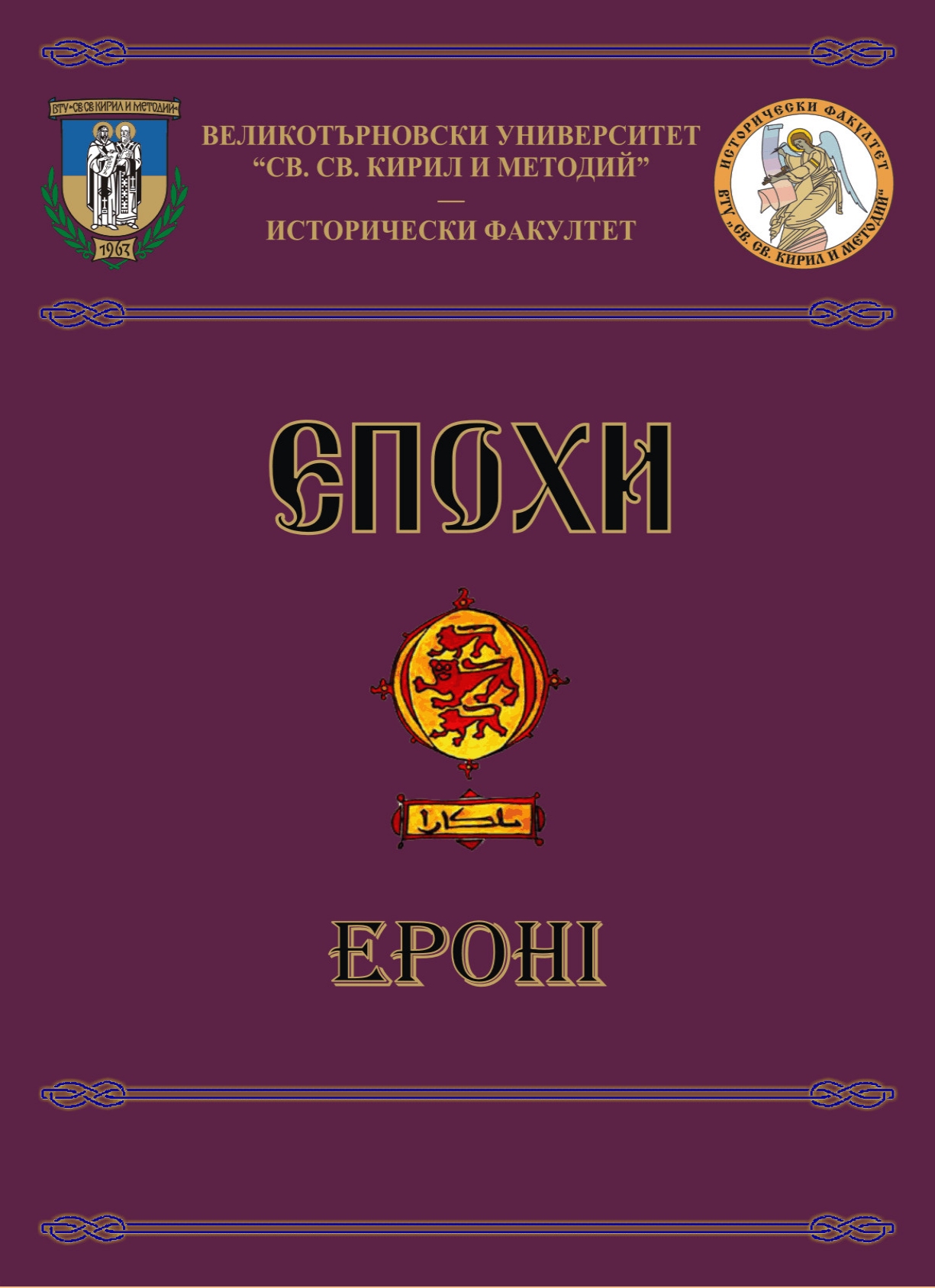La Bulgarie : parcours historiques d’un état en recherche de puissance
Bulgaria – the Historical Way of a State in Search of Sovereignty
Author(s): Olivier BuiretteSubject(s): History, Cultural history, Diplomatic history, Political history, Recent History (1900 till today), Pre-WW I & WW I (1900 -1919), Interwar Period (1920 - 1939)
Published by: Великотърновски университет „Св. св. Кирил и Методий”
Keywords: Bulgaria; sovereignty; Byzantium; the Ottoman Empire; Bulgarian National Revival; Eastern Question; Crimean War; Russo-Turkish War 1877–1878; First World War.
Summary/Abstract: On the basis of observation made in his PhD dissertation on the topic “The defeated countries in the First World War – reparations after the defeat”, tracing out the course of the negotiations on the enforcement of military and financial obligations for Germany and her allies, as well as on the grounds of his studies about Aleksandar Stamboliyski’s activities and the BZNS (Bulgarian Agrarian People’s Union) government, following the 1914–1918 war, the author concludes that it was Bulgaria that was unjustly imposed the most restrictions and she was burdened and damaged by the victors much more compared to Germany. In this regard the author offers an exposition, delivered as a report of an academic conference, which was held at the Paris III University, dedicated to the most important events in Bulgarian history – from the foundation of the state in the 7th century to the beginning of the social changes in 1989. In the so presented exposition the author strives for giving a concrete historical basis of conclusions and ascertainments on the question how the Bulgarian state “seeks sovereignty”. The exposition mostly relies on documents in the French diplomatic archive concerning the new and modern Bulgarian history. The first ascertainment of the author is that the Bulgarian state was forced to oppose two powerful empires – Byzantium and the Ottoman Empire. He makes a brief review of the events during the First Bulgarian state, mentions the capital Preslav and declares that Byzantium was “at times ally and at times enemy” of the Bulgarian rulers. In the article the author lays special emphasis on the role of Ivan Asen II, who, according to him, extended the territories of the Second Bulgarian state and her borders reached three seas. It is indicated that having existed for 700 years, the Medieval Bulgarian state ceased to exist as a result of the expansion of the Ottoman Empire, which managed to conquer the population of the whole Balkans and even part of Central Europe. Having lost their sovereignty, from the 14th century onwards the Bulgarian lands had the status of a Turkish province, while the Bulgarians were turned into a rayah, deprived of any rights. The author proclaims the Revival a “golden age” of the Bulgarian nation, he reminds of the national culture upsurge and underlines the role of the monasteries, as well as the isolated revolts and uprisings, which had been “barbarously suppressed by the Sublime Porte”. Those unsuccessful rebellions orientate the Bulgarian hopes for liberation towards Russia. The author reasonably associates the awakening of the Bulgarian nation with the Greek Revolution of the 1820s, the “Spring of Nations” of 1848–1849 and the Crimean War. The activities of the two Bulgarian Legions, as well as those of Georgi Rakovski, Lyuben Karavelov and Vasil Levski for the resurrection of free Bulgaria are briefly presented. In the article the 1877–1878 victory of Russia, the Treaty of San Stefano and the decisions of the Congress of Berlin, putting an end to the ambitions for creation of Greater Bulgaria, have been noted. The author underscores the significant role that France played for the development of the Eastern Question following the Crimean War. The unification of the Danubian Principalities in 1859 with the intervention of France serves as basis of the statement that being a protector of the principle of nationalities, the French Emperor Napoleon III could have lent his support to the Bulgarians, too. He writes: “Napoleon III could have supported the independence or autonomy of Bulgaria if the Bulgarian patriots had not oriented towards Russia by virtue of the Slavic fraternity. That choice would be paid off and we would see it a few years later”. The author is aware of the fact that the Eastern Question is complicated enough, making the reservation that Napoleon III’s stand in regard to the Bulgarians is a pitiable “omission”. The defeat of France in the 1870–1871 war against Prussia forced the governments in Paris to adopt a passive policy deprived of international initiatives. Using the evidence of the French diplomats’ reports regarding Bulgaria, the author makes clear how they advised the ministers in Paris about their position towards the Bulgarian problems in the intricate matter of national interests in the Balkans throughout the 19th–20th centuries. Assessing the social conditions that had prompted such an attitude, the author does not blame the Bulgarians for their reliance on Russia during the Revival and their mistrust to France during the two World Wars.
Journal: Епохи
- Issue Year: XXVI/2018
- Issue No: 1
- Page Range: 151-157
- Page Count: 7
- Language: French

